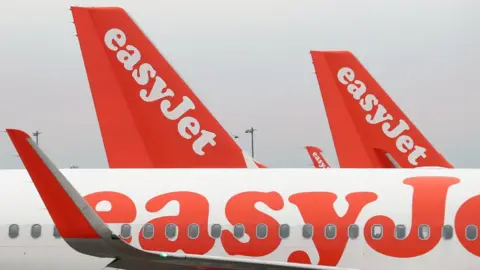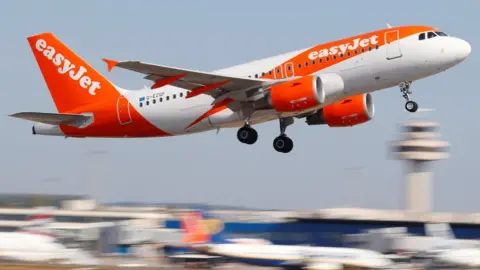Brexit fears fail to dent EasyJet bookings
 PA
PAFears of Brexit disruption have failed to deter passengers from booking flights next summer with EasyJet.
Bookings were "promising" and slightly ahead of summer this year, with half its seats sold for the first half of 2019, the airline said.
Pre-tax profits soared 41% to £578m for the year to 30 September.
Chief executive Johan Lundgren said the airline had been preparing for Brexit for the past two years by considering "every possible scenario".
He was adamant that flights would continue operating in April even if there was a no-deal scenario.
The company has established EasyJet Europe, headquartered in Vienna, which will enable EasyJet to continue to operate flights both across the EU and domestically within EU countries regardless of the Brexit outcome.
EasyJet's profits rose despite it spending £40m on expansion at Tegel airport in Berlin after buying parts of Air Berlin and £65m on IT costs.
The airline flew a record 88.5 million passengers in the past year, up 10.2%, and revenues rose 16.8% to £5.9bn.
EasyJet plans to increase capacity by about 10% for the 2019 financial year.
 Reuters
ReutersThe company said revenues per seat - a key metric for airlines - would fall in the first half of the current financial year due to factors including the timing of Easter.
Mr Lundgren said he had no interest in buying FlyBe, the struggling regional airline seeking a buyer.
Investor caution
Shares in Easyjet fell 3.7% to £11.29 - far below the near-£18 they were trading at in June - making them the biggest faller on the FTSE 100.
Analysts at Liberum maintained their "hold" recommendation at £12.50 a share, warning: "The uncertainty faced by EasyJet in the short term remains substantial, with the outcome and implications of Brexit no clearer than two years ago, cost pressure from sterling weakness and the risk that fuel prices could reverse their recent declines and resume an upward path."
Bernstein analyst Daniel Roeska agreed that EasyJet's outlook for 2019 "continues to look challenging" due to fuel and other costs.
The full-year dividend will rise 43% to 58.6p a share.
